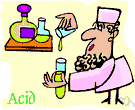acid
Also found in: Thesaurus, Medical, Financial, Acronyms, Idioms, Encyclopedia, Wikipedia.
ac·id
(ăs′ĭd)n.
1. Chemistry
a. Any of a class of substances whose aqueous solutions are characterized by a sour taste, the ability to turn blue litmus red, and the ability to react with bases and certain metals to form salts.
b. A substance that yields hydrogen ions when dissolved in water.
c. A substance that can act as a proton donor.
d. A substance that can accept a pair of electrons to form a covalent bond.
2. A substance having a sour taste.
3. The quality of being sarcastic, bitter, or scornful: wrote with acid about her first marriage.
4. Slang See LSD1.
adj.
1. Chemistry
a. Of, relating to, or containing an acid.
b. Having a high concentration of acid.
c. Having the characteristics of an acid.
2.
a. Having a pH of less than 7.
b. Having a relatively high concentration of hydrogen ions.
3. Geology Containing a large proportion of silica: acid rocks.
4. Having a sour taste. See Synonyms at sour.
5. Biting, sarcastic, or scornful: an acid wit; an acid tone of voice.
ac′id·ly adv.
ac′id·ness n.
American Heritage® Dictionary of the English Language, Fifth Edition. Copyright © 2016 by Houghton Mifflin Harcourt Publishing Company. Published by Houghton Mifflin Harcourt Publishing Company. All rights reserved.
acid
(ˈæsɪd)n
1. (Chemistry) any substance that dissociates in water to yield a sour corrosive solution containing hydrogen ions, having a pH of less than 7, and turning litmus red. See also Lewis acid
2. a sour-tasting substance
3. (Recreational Drugs) a slang name for LSD
adj
4. (Chemistry) chem
a. of, derived from, or containing acid: an acid radical.
b. being or having the properties of an acid: sodium bicarbonate is an acid salt.
5. sharp or sour in taste
6. cutting, sharp, or hurtful in speech, manner, etc; vitriolic; caustic
7. (Environmental Science) (of rain, snow, etc) containing pollutant acids in solution
8. (Geological Science) (of igneous rocks) having a silica content of more than 60% of the total and containing at least one tenth quartz
9. (Metallurgy) metallurgy of or made by a process in which the furnace or converter is lined with an acid material: acid steel.
[C17: (first used by Francis Bacon): from French acide or Latin acidus, from acēre to be sour or sharp]
ˈacidly adv
ˈacidness n
ˈacidy adj
Collins English Dictionary – Complete and Unabridged, 12th Edition 2014 © HarperCollins Publishers 1991, 1994, 1998, 2000, 2003, 2006, 2007, 2009, 2011, 2014
ac•id
(ˈæs ɪd)n.
1. a compound usu. having a sour taste and capable of neutralizing alkalis and turning blue litmus paper red, containing hydrogen that can be replaced by a metal or an electropositive group to form a salt, or containing an atom that can accept a pair of electrons from a base.
2. a substance with a sour taste.
3. biting criticism or sarcasm.
4. Slang. the drug LSD.
adj. 5.
a. belonging or pertaining to acids or the anhydrides of acids.
b. having only a part of the hydrogen of an acid replaced by a metal or its equivalent: an acid phosphate.
c. having a pH value of less than 7. Compare alkaline.
6. characterized by a high concentration of acid.
7. sharp or biting to the taste; sour: acid fruits.
8. sharp, biting, or ill-natured in mood or manner; caustic: acid wit.
9. vividly intense in color: acid green.
10. (of igneous rock) rich in silica.
[1620–30; < Latin acidus sour, akin to ācer sharp, acētum vinegar, acicula]
ac′id•ly, adv.
ac′id•ness, n.
Random House Kernerman Webster's College Dictionary, © 2010 K Dictionaries Ltd. Copyright 2005, 1997, 1991 by Random House, Inc. All rights reserved.
ac·id
(ăs′ĭd) Any of a class of compounds that form hydrogen ions when dissolved in water. They also react, in solution, with bases and certain metals to form salts. Acids turn blue litmus paper red, have a sour taste, and have a pH of less than 7. Compare base.
acidic adjective
The American Heritage® Student Science Dictionary, Second Edition. Copyright © 2014 by Houghton Mifflin Harcourt Publishing Company. Published by Houghton Mifflin Harcourt Publishing Company. All rights reserved.
acid
A solution of a substance in water which has a pH of less than 7.
Dictionary of Unfamiliar Words by Diagram Group Copyright © 2008 by Diagram Visual Information Limited
ThesaurusAntonymsRelated WordsSynonymsLegend:
Switch to new thesaurus
| Noun | 1. |  acid - any of various water-soluble compounds having a sour taste and capable of turning litmus red and reacting with a base to form a salt acid - any of various water-soluble compounds having a sour taste and capable of turning litmus red and reacting with a base to form a saltalcapton, alkapton, homogentisic acid - an acid formed as an intermediate product of the metabolism of tyrosine and phenylalanine arsenic acid - an acid formed from arsenic pentoxide cerotic acid, hexacosanoic acid - a white solid fatty acid found in waxes (such as beeswax) chloric acid - (HClO3) a strong unstable acid with an acrid odor found in chlorate salts chlorous acid - (HClO2) a strongly oxidizing acid; known only in solution monobasic acid - an acid containing only one replaceable hydrogen atom per molecule dibasic acid - an acid containing two replaceable hydrogen atoms per molecule tribasic acid - an acid containing three replaceable hydrogen atoms per molecule tetrabasic acid - an acid containing four replaceable hydrogen atoms per molecule fulminic acid - (CNOH) an unstable acid occurring mainly in the form of explosive salts and esters that is isomeric with cyanic acid gamma acid - a crystalline acid used to make azo dyes hydriodic acid - (HI) a colorless or yellow aqueous solution of hydrogen iodide; "hydriodic acid is a strong acid" hydrocyanic acid, prussic acid - a solution of hydrogen cyanide in water; weak solutions are used in fumigating and in the synthesis of organic compounds hydroxy acid - any acid that has hydroxyl groups in addition to the hydroxyl group in the acid itself hyponitrous acid - an explosive white crystalline weak acid (H2N2O2) lysergic acid - a crystalline acid often used in medical research; obtained from ergotic alkaloids manganic acid - a dibasic acid (H2MnO4) found only in solution and in manganate salts 2-methylpropenoic acid, methacrylic acid - an unsaturated acid (C4H6O2) used to make resins and plastics selenic acid - a strong acid (H2SeO4) analogous to sulfuric acid sulfonic acid, sulphonic acid - an acid derived from sulphuric acid titanic acid - a white weak acid that is a hydrated form of titanium dioxide perchloric acid - a powerful oxidizing agent; forms perchlorates carboxylic acid - an organic acid characterized by one or more carboxyl groups aminobenzoic acid - a derivative of benzoic acid aqua fortis, nitric acid - acid used especially in the production of fertilizers and explosives and rocket fuels nitrous acid - an unstable inorganic acid known only in solution and as nitrite salts aqua regia, nitrohydrochloric acid - a yellow fuming corrosive mixture of nitric and hydrochloric acid that dissolves metals (including gold) barbituric acid, malonylurea - a white crystalline acid derived from pyrimidine; used in preparing barbiturate drugs lansoprazole, Prevacid - antacid (trade name Prevacid) that suppresses acid secretion in the stomach boracic acid, boric acid - any of various acids containing boron and oxygen boric acid, orthoboric acid - a white or colorless slightly acid solid that is soluble in water and ethanol; used in the manufacture of glass and paper and adhesives and in detergents and as a flux in welding; also used as an antiseptic and food preservative bromic acid - an unstable acid used as an oxidizing agent carbamic acid - an acid that is known only by virtue of its salts (as ammonium carbamate) or its esters (as urethane) carbolic acid, hydroxybenzene, oxybenzene, phenylic acid, phenol - a toxic white soluble crystalline acidic derivative of benzene; used in manufacturing and as a disinfectant and antiseptic; poisonous if taken internally carbonic acid - a weak acid known only in solution; formed when carbon dioxide combines with water chromic acid - an unstable acid known only in solution and as chromate salts citric acid - a weak water-soluble acid found in many fruits (especially citrus fruits); used as a flavoring agent chemical compound, compound - (chemistry) a substance formed by chemical union of two or more elements or ingredients in definite proportion by weight cyanic acid - a colorless poisonous volatile liquid acid that hydrolyzes readily to ammonia and carbon dioxide cyanuric acid - a trimer of cyanic acid ferricyanic acid - a brown unstable acid formed from ferricyanide ferrocyanic acid - a white unstable acid formed from ferrocyanide salts fluoroboric acid - an acid of fluorine and boron fluosilicic acid, hydrofluosilicic acid - an unstable poisonous corrosive acid known primarily in the form of its salts |
| 2. |  acid - street name for lysergic acid diethylamide acid - street name for lysergic acid diethylamideback breaker, battery-acid, Elvis, loony toons, Lucy in the sky with diamonds, window pane, superman, Zen, pane, dose, dot LSD, lysergic acid diethylamide - a powerful hallucinogenic drug manufactured from lysergic acid | |
| Adj. | 1. |  acid - harsh or corrosive in tone; "an acerbic tone piercing otherwise flowery prose"; "a barrage of acid comments"; "her acrid remarks make her many enemies"; "bitter words"; "blistering criticism"; "caustic jokes about political assassination, talk-show hosts and medical ethics"; "a sulfurous denunciation"; "a vitriolic critique" acid - harsh or corrosive in tone; "an acerbic tone piercing otherwise flowery prose"; "a barrage of acid comments"; "her acrid remarks make her many enemies"; "bitter words"; "blistering criticism"; "caustic jokes about political assassination, talk-show hosts and medical ethics"; "a sulfurous denunciation"; "a vitriolic critique"unpleasant - disagreeable to the senses, to the mind, or feelings ; "an unpleasant personality"; "unpleasant repercussions"; "unpleasant odors" |
| 2. | acid - being sour to the taste sour - having a sharp biting taste | |
| 3. | acid - having the characteristics of an acid; "an acid reaction" chemical science, chemistry - the science of matter; the branch of the natural sciences dealing with the composition of substances and their properties and reactions acidic - being or containing an acid; of a solution having an excess of hydrogen atoms (having a pH of less than 7) |
Based on WordNet 3.0, Farlex clipart collection. © 2003-2012 Princeton University, Farlex Inc.
acid
adjective
the acid test test, proof, trial, check, investigation, analysis, assessment, examination The perception of fairness is the acid test for democracy.
Acids
Specific acids abietic acid, acetic acid, alginic acid, aminobenzoic acid, aspartic acid, barbituric acid, benzoic acid, boric acid, butyric acid, carbonic acid, chloric acid, chloroacetic acid, chlorous acid, cholic acid, chromic acid, cinnamic acid, citric acid, crotonic acid, cyanic acid, decanedioic acid, decanoic acid, dichromic acid, dithionous acid, deoxyribonucleic acid, dodecanoic acid, erucic acid, formic acid, fulminic acid, fumaric acid, gallic acid, glacial acetic acid, glyceric acid, heptadecanoic acid, hexanoic acid, hydnocarpic acid, hydrochloric acid, hydrofluoric acid, hypochlorous acid, hypophosphoric acid, hypophosphorous, isocyanic acid, itaconic acid, lactic acid, linoleic acid, linolenic acid, lysergic acid, manganic acid, mucic acid, nitric acid, nitrous acid, nonanoic acid, octanedioic acid, oleic acid, orthophosphoric acid, oxalic acid, pantothenic acid, para-aminobenzoic acid, pectic acid, pentanoic acid, permanganic acid, phosphoric acid, phthalic acid, picric acid, platinocyanic acid, polyphosphoric acid, propanoic acid, prussic acid, pyroboric acid, pyrophosphoric acid, pyrosulphuric acid, racemic acid, ricinoleic acid, saccharic acid, selenic acid, selenious acid, silicic acid, sorbic acid, spiraeic acid (modern salicylic acid), stearic acid, suberic acid, succinic acid, sulphonic acid, sulphurous acid, tantalic acid, tartaric acid, telluric acid, terebic acid, terephthalic acid, thiocyanic acid, thiosulphuric acid, trichloroacetic acid, uric acid
Types of acid amino acid, carboxylic acid, dibasic acid, dicarboxylic acid, fatty acid, iodic acid, mineral acid, nucleic acid, periodic acid, polycarboxylic acid
Amino acids alanine, arginine, citrulline, cystine, glutamine, glycine, histidine, isoleucine, leucine, lysine, ethionine, ornithine, proline, serine, threonine, triiodothyronine
Collins Thesaurus of the English Language – Complete and Unabridged 2nd Edition. 2002 © HarperCollins Publishers 1995, 2002
acid
adjective1. Having a taste characteristic of that produced by acids:
The American Heritage® Roget's Thesaurus. Copyright © 2013, 2014 by Houghton Mifflin Harcourt Publishing Company. Published by Houghton Mifflin Harcourt Publishing Company. All rights reserved.
Translations
حامِضحَمْضحِمْض، مَادَّة حَامِضِيَّهلاذِع، قَارِص
киселкиселинен
àcid
kyselinakyselýsarkastickýjedovatý
syre-syresyre-sursure
hapehappelinehapukibe
happoainehapanhapokas
kiselinakiselinskikiseo
sav
beiskbeisktbeiskurmeinhæðiðmeinhæðin
酸酸性すっぱい
산산성의시다
kandusrūgštingumasrūgštisrūgštus
skābeskābsassdzēlīgsskāba
അമ്ലം
acidacidul lisergic dietilamida-25
kyselinakyslý
kiselkislakisla snovkislinakislo
kiselina
syrasyra-acidsur
กรด
تیزاب
axit
acid
[ˈæsɪd]B. ADJ
1. (= not alkaline) [soil, food, conditions] → ácido
2. (= sharp, bitter) [fruit, taste] → ácido
C. CPD acid drops NPL (Brit) → caramelos mpl ácidos
acid green N → verde m limón
acid head N (Drugs) → adicto/a m/f al ácido
acid house (music) N → música f acid
acid house party N → fiesta f acid
acid rain N → lluvia f ácida
acid rock N (Mus) → rock m acid
the acid test N (fig) → la prueba de fuego, la prueba decisiva
acid yellow N → amarillo m limón
acid green N → verde m limón
acid head N (Drugs) → adicto/a m/f al ácido
acid house (music) N → música f acid
acid house party N → fiesta f acid
acid rain N → lluvia f ácida
acid rock N (Mus) → rock m acid
the acid test N (fig) → la prueba de fuego, la prueba decisiva
acid yellow N → amarillo m limón
Collins Spanish Dictionary - Complete and Unabridged 8th Edition 2005 © William Collins Sons & Co. Ltd. 1971, 1988 © HarperCollins Publishers 1992, 1993, 1996, 1997, 2000, 2003, 2005
Collins English/French Electronic Resource. © HarperCollins Publishers 2005
acid
acid
:acid-proof
adj → säurebeständig
acid rain
n → saurer Regen
acid test
n → Feuerprobe f
acid-tongued
adj person, remark → scharfzüngig
Collins German Dictionary – Complete and Unabridged 7th Edition 2005. © William Collins Sons & Co. Ltd. 1980 © HarperCollins Publishers 1991, 1997, 1999, 2004, 2005, 2007
Collins Italian Dictionary 1st Edition © HarperCollins Publishers 1995
acid
(ˈӕsid) adjective1. (of taste) sharp or sour. Lemons and limes are acid fruits.
2. sarcastic. acid humour.
noun a substance, containing hydrogen, which will dissolve metals etc. She spilled some acid which burned a hole in her dress.
aˈcidity noun the quality of containing acid or too much acid.
Kernerman English Multilingual Dictionary © 2006-2013 K Dictionaries Ltd.
acid
→ حَمْض kyselina syre Säure οξύ ácido happo acide kiselina acido 酸 산 zuur syre kwas ácido кислота syra กรด asit axit 酸Multilingual Translator © HarperCollins Publishers 2009
ac·id
n. ácido;
acetic ___ → ___ acético;
boric ___ → ___ bórico;
___ -fast → acidorresistente;
___ -proof → a prueba de ___;
aminoacetic ___ → ___ aminoacético (suplemento dietético);
ascorbic ___ → ___ ascórbico;
aspartic ___ → ___ aspártico;
boric ___ → ___ bórico;
butyric ___ → ___ butírico;
chlorogenic ___ → ___ clorogénico;
cholic ___ → ___ cólico;
citric ___ → ___ cítrico;
deoxyribonucleic ___ → ___ desoxirribonucleico;
fatty ___ → ___ graso;
folic ___ → ___ fólico;
gastric ___ → ___ gástrico;
glucuramic ___ → ___ glucurámico;
glutamic ___ → ___ glutámico;
glycolic ___ → ___ glicólico;
lactic ___ → ___ láctico;
nicotinic ___ → ___ nicotínico;
nitric ___ → ___ nítrico;
nucleic ___ → ___ nucleico;
phenic ___ → ___ fenílico;
ribonucleic ___ → ___ ribonucleico;
salicylic ___ → ___ salicílico;
sulfonic ___ → ___ sulfónico;
sulfuric ___ → ___ sulfúrico;
uric ___ → ___ úrico.
English-Spanish Medical Dictionary © Farlex 2012
acid
adj & n ácido; fatty —ácido graso (V. también fatty acid); gastric o stomach —ácido gástrico or del estómagoEnglish-Spanish/Spanish-English Medical Dictionary Copyright © 2006 by The McGraw-Hill Companies, Inc. All rights reserved.